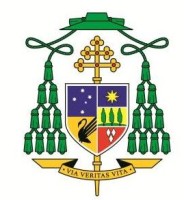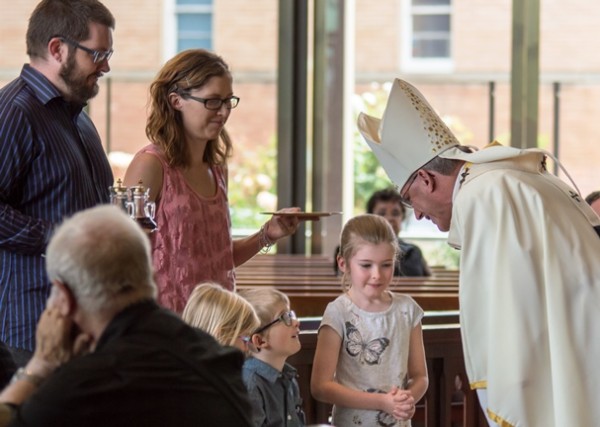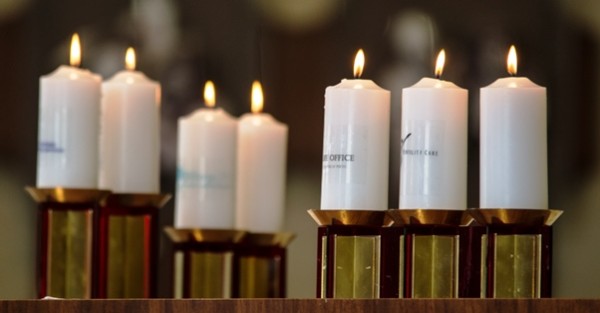Celebration of Life 2014

Mass in Celebration of Life 2014

Archbishop Costelloe receives Offertory gifts of bread, wine and water from a young family © Jae Cabagyo
Homily by the Most Rev Timothy Costelloe SDB, Archbishop of Perth
Saturday, 22 November 2014 in St Mary’s Cathedral, Perth
On April 8, 1991, I found myself sitting in a hospital room in Melbourne as my mother lay dying. Just a few days before I had rushed back from Rome, where I was a young priest studying theology, as my brother had told me the doctors believed that mum was very close to death.
As I sat in that hospital room my only brother was in another hospital in another part of Melbourne with his wife who was due to give birth that day, by caesarean section, to their first, and as it has turned out, their only child.
The doctors were surprised that my mum had lasted through the night. In the late morning I received a message from my brother to say that his wife had given birth to a daughter and that both the baby and her mother were fine. I leaned over mum and told her that she was now, for the first time, a grandmother to a beautiful baby girl. Mum could not speak or move, but a tear welled up in her eyes and ran down her cheek. Within half an hour mum had died.
On April 8, 1991, I came to understand, by personal experience, what my faith had always taught me: that life is precious, beautiful and sacred from its very beginnings to its end. It is true that its beginnings can be difficult – sometimes very difficult, and of course so can its ending. But what I came to understand much more clearly on that April day is that above all else life is a gift and a mystery which properly lies in the hands of God rather than in our own. We must receive this gift when it is given, cherish it while we have it, and surrender it trustfully to God when he calls us home.
Psalm 139 expresses this faith beautifully. The psalm tells us that it is God who knits us together in our mother’s womb, and it is God who decrees every one of our days before even one of them comes into being. The gospels complete this thought. When we come to the end of our lives we must, like Jesus himself, even in the midst of a suffering which might make us call out with him “My God, my God why have you abandoned me?” also say with him, “Father into your hands I entrust my spirit”. We are made by God and made for God and our life will only make sense, both in its moments of profound joy and in its moments of turbulence and sorrow, if we have come to understand this truth, not just in our heads but also in our hearts. Saint Augustine knew what he was saying when he reminded us that God has made us for himself and our human hearts will always be restless until they come to rest in him. In saying this of course Augustine was only reflecting on what Jesus himself says to us in this morning’s gospel; “Come to me all
you who labour and are overburdened and I will give you rest”.
It is because we are people of faith that we are able to say these things. It is because of our faith that we pray for the grace to live by what we believe, a task for the whole of our lives. But we know that so many others, perhaps even members of our own families or circles of friends, do not share our faith and do not have the same sense of the divine mystery and beauty of life that is so foundational for us. What is the Lord asking of us, as individuals and as a Church, in a world in which things we hold so dear seem so often to be under threat?

Candles from each of Perth Archdiocese's agencies that work with upholding and honouring the gift of life -
Billings Life, FertilityCare, Pregnancy Assistance, Catholic Marriage & Fertility Services, Respect Life Office
One of the things the Lord says to us, through the letter of the Apostle Paul to the Romans, is this: Do not model your behaviour on the contemporary world, but let the renewing of your minds transform you, so that you may discern for yourselves what is the will of God -- what is good and acceptable and mature (Rom 12:2). The Lord has called us into his Church not just for ourselves alone but so that through us the Lord might reach into the lives of others. It is not our task to allow the world around us to shape us: rather it is our task to allow God to re-shape us, and to reshape the world through us. And for this to happen we must do all we can to become people who are so attuned to the work of the Spirit of God in our lives that the beauty and dignity of human life shines through all we say and do.
In this regard today’s gospel can also help us. “Learn from me,” says Jesus, “for I am gentle and humble of heart”. It will be the quality of our own lives, the witness of our Christian conviction, and the gentle humility which characterizes us, which will convince others that we have a message worth listening to. It will be, in other words, the extent to which we are united to Jesus and ready to learn from him. We will then, as Pope Benedict urged us, be a Church, a people, who proposes ceaselessly but never imposes.
Of course what we are called to promote ceaselessly is the fact that life is a gift from God. We are not autonomous rulers over life but receivers and guardians of this precious gift. In our Judeao-Christian tradition this is expressed in the fundamental commandment: thou shalt not kill. In our Catholic faith this is absolutely foundational for us: no-one, in any situation, has the right to take an innocent life. In our own time we see this fundamental conviction being constantly challenged and relativized. So many people look with puzzlement, incomprehension and even hostility at us because we continue to proclaim and defend the sanctity of every human life. But the truth is, as Pope Francis has reminded us, if the most fundamental of human rights, the right to life, is disregarded or denied, then there is simply no solid basis for any other right.
There can be no doubt about where the Catholic faith stands on these matters. In the case of abortion for example, Pope Francis has reminded us that “every child that isn’t born, but is unjustly condemned to be aborted, has the face of Jesus Christ, has the face of the Lord”. In saying this the Pope is pointing us to another pillar of our faith. Not only is every human life a gift from the Lord: every human person is made in the image and likeness of God.
It is this belief, coupled with the conviction that the great task of the Church is to be the living sign of the ongoing presence of the Lord among us, that leads Pope Francis to remind us of another essential dimension of our call to be promoters and defenders of life. As disciples of Christ, members of his body, it is his face we must present to our world, his compassion people must experience in every encounter with us, his words they must hear coming from our lips. In this regard we might remember the story of the encounter between Jesus and the woman caught in adultery. At the end of that encounter Jesus told the woman to “go, and sin no more”. But before he said that to her, before, perhaps she was even able to really hear those words, he had first of all said to her, “I do not condemn you”. Pope Francis has told us that as members of the Lord’s Church we must be “healers of wounds and warmers of hearts”. And why? Because Jesus was, and we are his disciples.
Our first Australian Saint, Saint Mary of the Cross Mackillop, is famous for encouraging her sisters to “never see a need without doing something about it”. There is a great need in our time to celebrate, protect, welcome and promote God’s foundational gift of life. We must all do something about it. That is why we are here this morning. St Mary Mackillop is less well known for also encouraging her sisters to “never forget who it is you are following”. It is only by learning from the one who is meek and humble of heart, and by being living images of him as we seek to do something about this great challenge of our times, that God will be able to bring about, also through us, a renewal in the minds and hearts of the people of our time.
May God guide us all in this great challenge.
